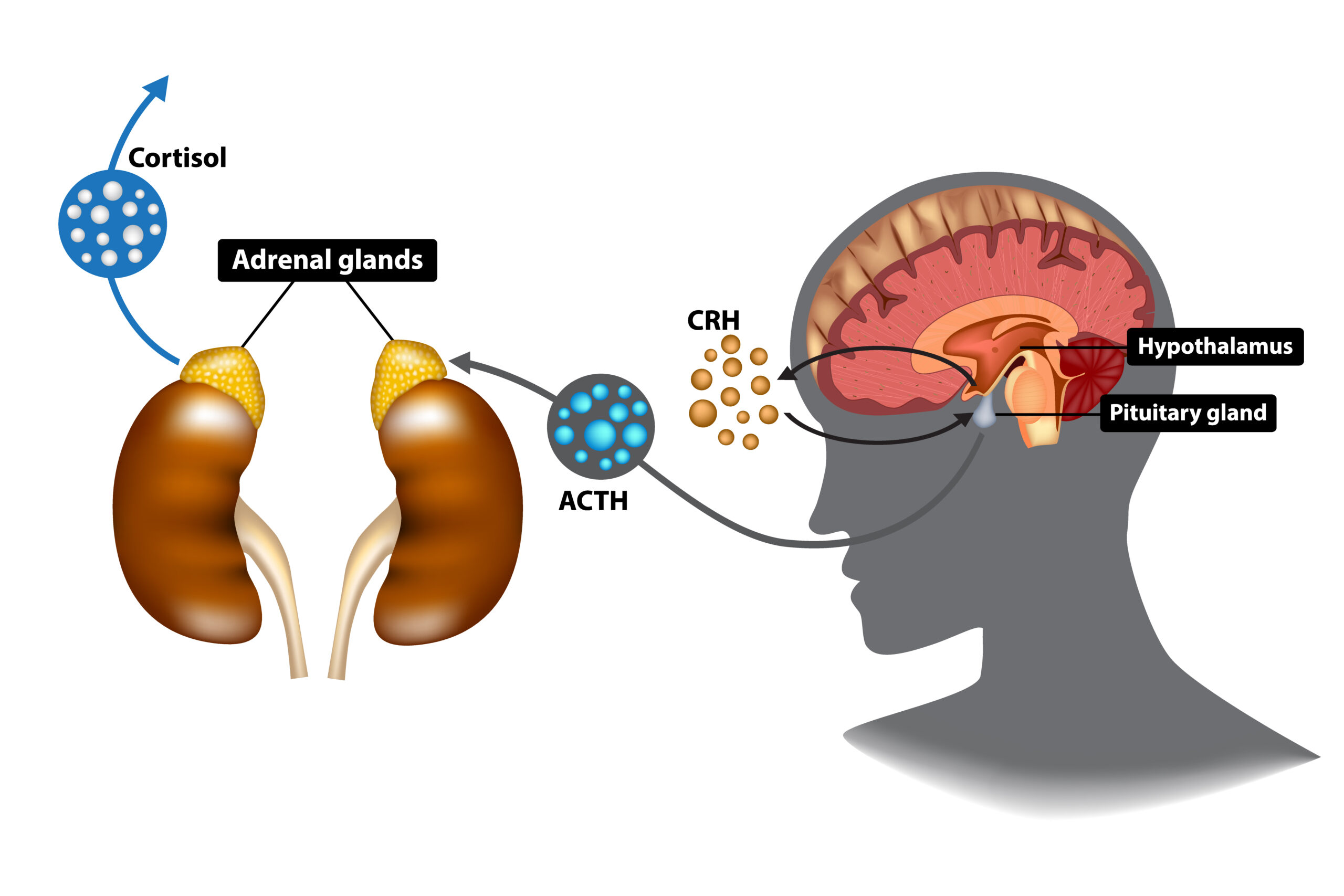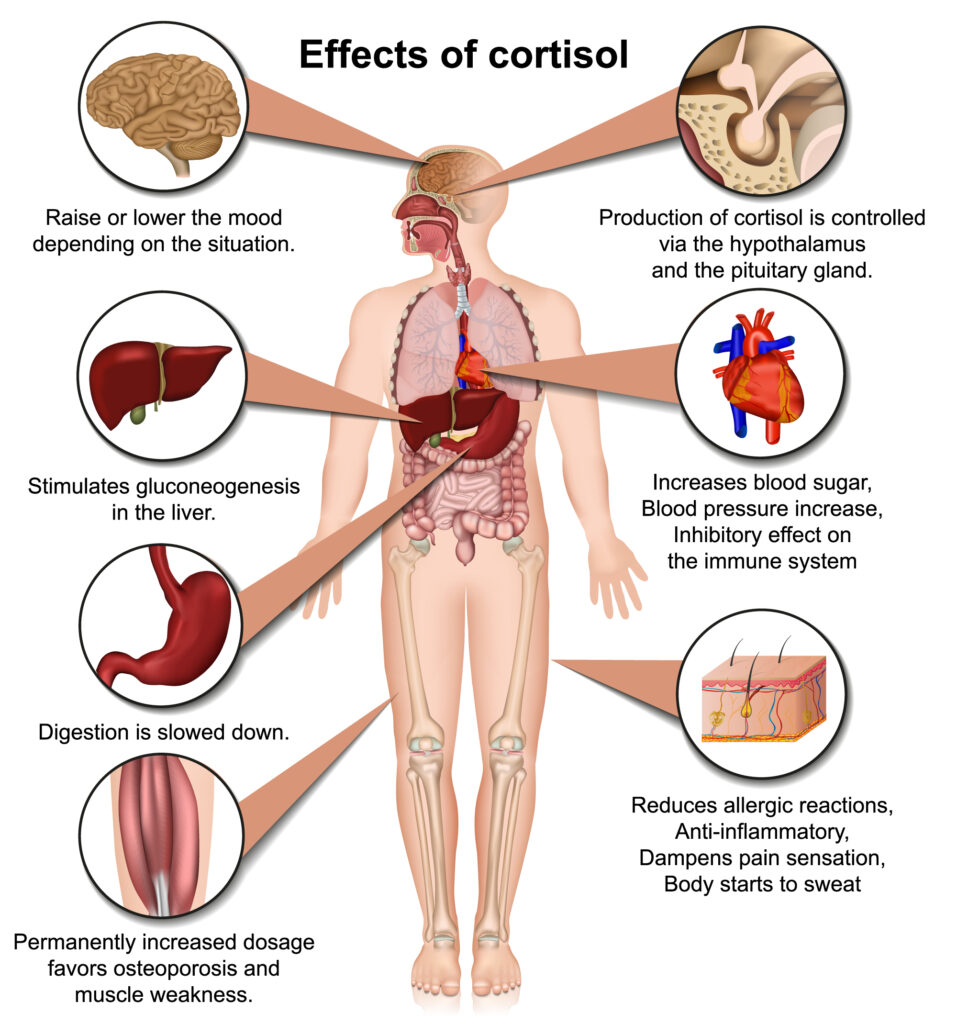Cortisol, our “fight or flight” hormone, is blamed for high blood pressure, stroke, anxiety—you name it. And yes, too much of it for a too long period of time is absolutely going to age you really fast and cause disease, and most of us deal with high cortisol levels daily due to a fast lifestyle. However, this hormone is crucial to our survival, and we can not live without it. Gaining a better understanding of cortisol’s function helps people realize that balancing this hormone—not eliminating it—is key to healthy living.
Cortisol is a steroid hormone made in the adrenal glands, and it is tightly connected with your motivation, mood, and fear. Secretion of the hormone is controlled by the hypothalamus, the pituitary gland, and the adrenal gland. Most cells within the body have cortisol receptors, and so cortisol can have lots of different effects depending on which sort of cells it is acting upon. These effects include :
- Control blood pressure
- Control effect on salt and water balance
- Regulate metabolism
- Regualte immune response
- Regulate the effects of insulin- a hormone that controls your blood sugar levels
- Reduce inflammation
- Help coordinate sleep cycles
- Assist with memory formulation
- Support the developing fetus during pregnancy
HOW IS CORTISOL CONTROLLED?
Levels of cortisol vary throughout the day but generally are higher in the morning when we wake up and then fall throughout the day. The cortisol awakening response (CAR) is a crucial point of reference within the healthy cortisol circadian rhythm, with cortisol secretion typically peaking between 30 and 45 min post-awakening. In people that work at night, this pattern is reversed, so the timing of cortisol release is clearly linked to daily activity patterns. In addition, in response to stress, extra cortisol is released to help the body to respond appropriately. The pituitary gland regulates cortisol production by the adrenal glands. When you wake up, exercise or you’re facing a stressful event, your pituitary gland reacts. It sends a signal to the adrenal glands to produce just the right quantity of cortisol.
WHAT CAUSES CORTISOL IMBALANCE?
- Chronic stress — your body can’t estimate the seriousness of a stressful situation, so something simple like a traffic jam can kick-start your stress response system. It would be best if you learned how to manage and control your stress. Often dietary changes, sleep hygiene, and regular exercise are all you need to become a master of your stress.
- Adrenal fatigue— your adrenal glands produce cortisol, so any issues with them can affect how much cortisol is produced. For people who suffer from adrenal fatigue, the problem often is waking up at 3 AM every night and not being able to get back to sleep for some time. Others struggle with a frustrating waking pattern every two to three hours before dozing off again, never getting a full stretch of deep sleep. For healthy adrenal function, follow are a diet low in sugar, caffeine, and junk food.
- Medication — certain medications like corticosteroids and oral contraceptives might increase your cortisol levels. If you need to take any medications of that sort, look for alternative solutions.
- A pituitary gland issue — an overactive pituitary gland stimulates your adrenal glands to produce too much cortisol. To help your pituitary gland: reduce sodium and sugar intake, don’t eat a lot before bedtime, lose body fat and fast intermittently.
- Malnutrition — for example, if you suffer from an eating disorder, malabsorption, or digestive issues. Pay close attention to your digestive system. Often we think heartburn and stomachaches are normal, but they are not; they signal abnormality in the digestive tract. Malnutrition is not only caused by reduced food intake, but by compromised digestive system as well.
SYMPTOMS OF HIGH CORTISOL LEVELS:
- Rapid weight gain mainly in the face, chest, and abdomen contrasted with slender arms
- High blood pressure
- High blood sugar
- Fatigue
- Difficulty concentrating
- Sleep issues
- Mood swings, which show as anxiety, depression, or irritability
- Increased thirst and frequency of urination
- Muscle weakness
- Osteoporosis
- Getting sick often
- Acne
- Thinning hair
- Bruising and slow wound healing
- Weak bones
- Low libido
- Irregular periods
Over time, high cortisol can put you at risk of heart disease, osteoporosis, diabetes, and poor mental health.
- Weakness
- Fatigue
- Dizziness (especially upon standing)
- Weight loss
- Muscle weakness
- Low blood pressure
- M
ood changes
Cortisol deficiency occurs when the adrenal glands do not produce enough cortisol. The condition is usually the result of a problem with the immune system, which causes it to attack the adrenal gland’s outer layer (the adrenal cortex), disrupting the production of the steroid hormones aldosterone and cortisol.
Overall, should you desire to behave responsibly towards your body, pay close attention to your body’s daily performance (physical and mental) and do not ignore or brush away symptoms. Those symptoms don’t show up to annoy you; it is the way your body says something is out of order. Do everything in your power to assist your biology in thriving rather than slowly destroying it with your daily choices of behaviour.

